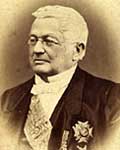 |
Marie-Joseph-Louis-Adolphe Thiers
b. 15 Apr 1797, Marseille, Bouches-du-Rhône [1]
d. 3 Sep 1877, Saint-Germain-en-Laye, Seine-et-Oise |
| Title: |
Président du Conseil, Chef du Pouvoir exécutif de la République française (President of the Council, Chief of the Executive Power of the French Republic) [2] |
| Term: |
17 Feb 1871 - 31 Aug 1871 |
| Chronology: |
17 Feb 1871, appointed, resolution of the National Assembly,
session of the Assemblée nationale (National Assembly), Grand Théâtre, Bordeaux [3][4] |
| Title: |
Président de la République française (President of the French Republic) |
| Term: |
31 Aug 1871 - 24 May 1873 |
| Chronology: |
31 Aug 1871, office of Chef du Pouvoir exécutif is transformed into the office of Président de la République française in accordance with a law passed by the National Assembly 31 Aug 1871 and promulgated on the same day [5][6] |
|
24 May 1873, letter of resignation (dated 24 May 1873, Versailles) is communicated to the National Assembly, a motion for not accepting failed,
session of the National Assembly, opéra du Palais de Versailles, Versailles [7] |
| Biography: |
| Moved to Paris in 1821 after dropping lawyer practice in Aix-en-Provence; worked as journalist and historian; published 10 volumes of Histoire de la révolution française (1820s); cofounder of Le National newspaper (1830); elected deputy for Aix-en-Provence to the Chambre des députés [Chamber of Deputies] (Oct 1830); interior minister (11 Oct 1832 - 31 Dec 1832, 4 Apr 1834 - 10 Nov 1834 and 18 Nov 1834 - 22 Feb 1836) under the Orleanist monarchy; briefly served as President of the Council of Ministers and minister for foreign affairs (22 Feb 1836 - 6 Sep 1836); published 20-volume Histoire du consulat et de l'empire (1840s); appointed President of the Council of Ministers (1 Mar 1840 - 29 Oct 1840) and foreign minister (1 Mar 1840 - 29 Oct 1840); during the revolution of 1848 attempted to save the monarchy and agreed to form the government on 24 Feb 1848, but the ensuing revolution put an end to the monarchy of Louis-Philippe I; elected deputy to the Assemblée nationale constituante (Constituent National Assembly) in 1848 from four départements; emerged as a moderate leader (1850s), who opposed the coup of Louis-Napoléon Bonaparte; arrested and exiled to Switzerland; returned to France (1852), but stayed away from politics for almost a decade; elected (1863) deputy from Paris to the Corps législatif; advocating aggressive policy against Prussia, suddenly changed his views, disapproved the Franco-Prussian war and won popular support; appointed (17 Feb 1871) Chief of the Executive Power and President of the Council of Ministers (17 Feb 1871 - 24 May 1873); signed preliminary peace agreement with Otto von Bismarck (26 Feb 1871), ratified by the National Assembly (1 Mar 1871); Treaty of Frankfurt was concluded on 10 May 1871; government moved to Versailles by the end of March 1871; radical government known as the Commune de Paris (Paris Commune) seized the state power in the capital (March 1871), but the revolt was severely suppressed; title was changed to President of the French Republic (31 Aug 1871); faced a strong monarchist opposition, but a lack of consent between Legitimists and Orleanists allowed to preserve the republican form of government; managed to collect funds to pay off the war indemnity to the German Reich; open conversion to republicanism outraged the monarchists and led to resignation submitted to the National Assembly on 24 May 1873; a motion to decline the resignation, initiated by republican deputies, failed the same day (362 against 331 votes); was elected deputy from the Seine département and used his influence against President Patrice de Mac-Mahon (the Manifest of 363); died during an electoral campaign. |
| Biographical sources: Dictionnaire des parlementaires français 1789-1889, 5:400-408;
Dansette (1953) |
| |
| [1] |
This date should not be confused with other dates in April 1797 erroneously cited in various sources. The birth record of Thiers signed by an accoucheur on 29 Germinal, Year V (18 Apr 1797) is currently preserved in the Archives of the département of Bouches-du-Rhône and confirms that the child had been born on 26 Germinal, Year V (15 Apr 1797). The record is cited in full but with miscalculated dates, 17 April (1797) and 14 April (1797) respectively, in
Dictionnaire des parlementaires français 1789-1889, 5:400. |
| [2] |
Despite his appointment as chef du Pouvoir exécutif de la République française by resolution of the Assembly of 17 Feb 1871 ("M. Thiers est nommé chef du pouvoir exécutif de la République française... "), Thiers immediately assumes the style "Président du Conseil, Chef du Pouvoir exécutif de la République française". When his letter of gratitude to the Assembly signed "Le président, chef du pouvoir exécutif de la République française" was presented at the session of 18 Feb 1871, deputy Léon Journault voiced a protest against it, but found no support to make a formal motion. Thiers continued to use this style in all legislative acts until 31 Aug 1871. |
| [3] |
Annales de l'Assemblée nationale, 1:64. |
| [4] |
Bulletin des lois de la République française, № 48: № 331 - Résolution de l'Assemblée nationale ayant pour objet de nommer M. Thiers Chef du Pouvoir exécutif de la République française, in "Bulletin des lois de la République française", XIIe série, premier semestre de 1871. Partie principale. T. 2 (Paris: Imprimerie nationale, 1871), p. 71. |
| [5] |
Annales de l'Assemblée nationale, 5:269-270. |
| [6] |
JORF, No. 245, 3 Sep 1871, p. 3161. |
| [7] |
Annales de l'Assemblée nationale, 18:63-65. |
|
Image: photograph by Eugène Appert. |

